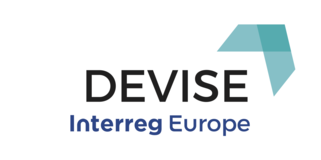DEVISE is arriving to the end. After having exchanged good practices and experiences, inspired each other within the partnership and developed 10 Regional Action Plans, it's time to review the changes achieved in each of the policy instruments thanks to this project. This week, we speak with Gorka Díez and Lourdes Blanco, DEVISE project officers at Fomento San Sebastián (FSS) in the Basque Country (Spain).
What policy instrument were you addressing when the DEVISE project commenced? Why?
Gorka: Through the participation in the DEVISE project, FSS addressed the local policy instrument ‘Strategic Plan San Sebastian 2020’, and more concretely its objective 7: to boost the entrepreneurial culture, training and offer the adequate conditions for the development of innovative business initiatives, especially considering the capacities the city accounts for.
Lourdes: This became especially relevant to promote the digital transformation processes of the traditional and strategic sectors identified in the city such as the retail and hospitality sectors, which are still one of the historical mainstays in the production profile of the city of Donostia-San Sebastián and of its job market. In this context, they were the main beneficiaries of the activities undertaken by FSS in DEVISE as well as of the actions described in the Action Plan released during project´s lifetime.
What has specifically changed in your policies and your region thanks to the project?
Gorka: The main policy change that could be highlighted in the addressed Policy Instrument (PI) and in the local policies to support the digital transformation of SMEs in the retail and hospitality sectors is the reinforcement of that support with the execution of two new municipal programmes (Technology Consultancy Programme and Vouchers Programme for the implementation of digital solutions and applications in the retail and hospitality sectors) and the renewal of a third one (Awareness and digital training programme also aimed at these sectors). The policy change of the addressed PI comes in the form of execution of these three municipal programs included in the framework of the Strategic Plan San Sebastian 2020 and their execution contributes concretely to its obj.7.
Lourdes: The change could be also completed with other important mentality change of the local involved stakeholders. On the one hand, there is a greater approach of companies that provide digital services to the local retail and hospitality companies, in terms of understanding the sector’s situation and its real needs for digital transformation. On the other hand, the retail and hospitality companies have also accelerated the process of raising awareness about the need to move towards their digital transformation and competitive change. This mentality change and the greater involvement of companies in these digital transformation processes have also favoured the fact that FSS has been able to launch and consolidate a project such as Donostia / San Sebastián Market Plaza, a municipal digital platform of services and sale of products of the retail sector in the city.
Which good practices have inspired these changes?
Gorka: Learnings and inspiration sources from DEVISE significantly contributed to the creation of the annual 2020 programmes to face Covid-19´s impact and to consolidate the abovementioned programmes in the later years. Part of the learnings were gathered during activities carried out with our local stakeholders (e.g., stakeholder meetings, intersectoral networking breakfasts) but also with the project partners (e.g. staff exchanges, Good Practices shared in this project). In relation to the Good Practices, the ones that inspired these 3 actions/programmes of Fomento de San Sebastián were the following:
- Digital Vouchers and Apollo programmes from Laval Mayenne Technopole (FR)
- Map of Industry 4.0 Technology enablers and Industry 4.0 Technology Audits from the Regional Government of Cantabria (ES)
- Technology Gateways from Enterprise Ireland-North West Regional Assembly (IE)
- Hangar K and IBN–Digitising Manufacturing from the West Flanders region (BE)
Would you like to highlight any other improvements?
Lourdes: Finally, we would like to point out that the way citizens perceive local urban commerce has changed, highlighting the importance of local physical commerce, its social and human dimension as part of the shopping experience, giving it, more clearly, values consistent with major social trends such us digitalization, sustainability, social cohesion, proximity, and quality of life. The DEVISE project has promoted a greater and more effective implementation of digital solutions in the retail and hospitality sectors, and consequently improved the digital skills of their workers. This has favoured and strengthened the positioning of companies in these sectors and brought them closer to the new consumer.











